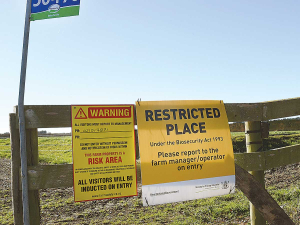Damien O’Connor: NZ united on global trade
When it comes to international trade, politicians from all sides of the aisle are united, says Labour's trade spokesman Damien O'Connor.
 New Zealand is on track to eradicate M. bovis, says Biosecurity and Agriculture Minister Damien O'Connor.
New Zealand is on track to eradicate M. bovis, says Biosecurity and Agriculture Minister Damien O'Connor.
Biosecurity and Agriculture Minister Damien O’Connor says there are currently no farms in New Zealand infected with M. bovis.
The last-known infected property in Mid-Canterbury has been destocked and declared disease-free, taking New Zealand to zero confirmed cases.
O’Connor made the announcement today as the government’s eradication plan moves into its next phase.
“Five years of hard work, sacrifice, and collaboration with MPI, DairyNZ and Beef + Lamb New Zealand have brought us to this milestone on the road to eradication,” says O’Connor.
“I want to acknowledge the hardship which affected farmers and families have felt during this time. I also want to thank the broader sector who’ve stepped up their animal tracing efforts, allowing us to move the programme on to a new surveillance phase.”
O’Connor says that allowing M. bovis to become endemic in New Zealand was estimated to cost $1.3 billion in lost production in the first ten years alone.
“At the height of the programme, there was a peak of 40 infected properties across the country and today we have none.
“While we’ve had brief periods in the past where we had no infections, we still had possible cases being investigated. This is the first time we’ve had no cases and no investigation,” he says.
Back in 2018, the decision was made to focus on eradicating M. bovis from New Zealand, a move designed to protect the national herd, Kiwi farming businesses, and export growth. The alternative was a long-term management plan.
O’Connor says that looking back, he is confident that it was the right decision.
“We always knew it wouldn’t be easy, especially for the farmers affected, but when you looked at the impact that living with M. bovis has on animal welfare and on farmers, we knew we had to try.”
“We can’t say yet that we’ve reached eradication as we may still detect new cases in the future, however, with no confirmed infection from our background surveillance since April 2022, we can be confident that we are moving in the right direction.”
O’Connor says that all indicators – from bulk milk testing to beef herd surveillance – have given the government confidence that the 10-year eradication plan is working.
“With almost 184,000 cattle culled, including 280 farms depopulated, nearly 3,000 farms subject to movement controls and many more undergoing on-farm testing, the programme has touched nearly every farming community across the country.”
He says the focus now is on next steps for the M. bovis programme, with a move to a national pest management plan (NPMP), similar to the one used for Bovine Tuberculosis control.
“As New Zealand becomes clear of active M. bovis infection and work centres on background surveillance, the time is right to transition to a new model to continue to build our farming sector’s resilience and strengthen the biosecurity system,” O’Connor says.
He says OSPRI has been nominated as the management agency, adding that it is well-placed to manage M. bovis.
“We’ll be consulting with farmers and the public about the exact shape of the NPMP later this month,” he says.
“We’re only as good as our detection systems and our on-farm records. It’s vital that we all stay vigilant and diligent so that the herds sacrificed and the emotional hardship of affected farmers wasn’t all for nothing.”
The World Wide Sires National All Day Breeds Best Youth Camp Best All Rounder plaudit has become family affair, with 2026 Paramount Cup winner Holly Williams following in her sister Zara's footsteps.
DairyNZ is giving New Zealand farmers a unique opportunity to gain hands-on governance and leadership experience within the dairy sector.
Herd improvement company LIC has posted a 5.2% lift in half-year revenue, thanks to increasing demand for genetics.
According to the latest Fresh Produce Trend Report from United Fresh, 2026 will be a year where fruit and vegetables are shaped by cost pressures, rapid digital adoption, and a renewed focus on wellbeing at home.
The Roar is a highlight of the game hunting calendar in New Zealand, with thousands of hunters set to head for the hills to hunt male stags during March and April.
OPINION: The past few weeks have been tough on farms across the North Island: floods and storms have caused damage and disruption to families and businesses.

OPINION: Meanwhile, red blooded Northland politician Matua Shane Jones has provided one of the most telling quotes of the year…
OPINION: This old mutt has been around for a few years now and it seems these ‘once in 100-year’ weather…